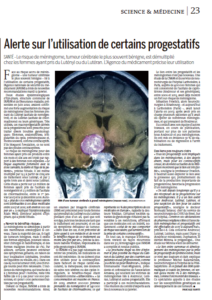Lotényl and Lotéran, drugs for gynecological disorders, are to be used with caution due to the risk of benign brain tumors
The medication agency has issued new recommendations in particular concerning these drugs.
Article reserved for subscribers
Faced with the increased risk of meningioma - a cerebral tumor that is most often benign - linked to the use of certain progestins, the National Medicines Safety Agency (ANSM) issued new recommendations on Tuesday, January 12.
Two epidemiological studies of Epi-Phare, a common structure of the ANSM and health insurance, presented in June 2020 , had confirmed a strong increase in the risk of meningioma in women taking lutenyl (nomestrol acetate), and luteran (chlormadinone acetate) or their generics, progesterone derivatives. Very used, these macroprogestatives are prescribed to treat various gynecological disorders: fibroids, endometriosis, cycle irregularities, premenopause and, less often, as contraceptives. If they block ovulation, they are not contraceptive pills.
"More than 1,000 operated meningiomas are attributable to these two molecules between 2007 and 2018, or around 100 cases per year" Alain Weill
The risk of meningioma for women who have taken these products between six months and ten years is tripled compared to not exposed women. "The risk increases sharply with the cumulative dose, the duration and age of the patient," said the study. It is even multiplied by 12.5 from five years of treatment under Lotényl, and by 7 after three and a half years under Lutéran. This study focused on 1.8 million women who took nomigestrol acetate and 1.5 million chlormaudinone acetate, between January 1, 2007 and December 31, 2018. In total, "more than 1,000 meningiomas operated are attributable to these two molecules between 2007 and 2018, or about 100 cases per year" , explained the epidemiologist Alain Weill, of Epi-Phare, which piloted the study. "It is a question of dose and duration of exhibition ," he continues.
"Review the risk of risk with your doctor"
Meningioma develops from the membranes that wrap the brain. In the majority of cases, these are benign tumors, but there are atypical forms, which can require surgery and radiotherapy, and malignant forms (less than 1% of identified meningiomas). In addition, some may cause annoying symptoms, due to their location (headache, balance or visual disorders, etc.). In these cases, or if the tumor grows, heavy surgery may be necessary. The incidence of meningioma, which affects 2 to 3 women for a man, remains very low (from 8 to 9 cases per 100,000 people, and 1 per thousand people treated by these progestins).
Faced with this risk, the ANSM issued new recommendations , based on the advice of the expert committee made up of doctors, learned companies and patient associations.
Consult: The opinion of the Expert Committee rendered on January 12
Thus, an examination by brain imaging (MRI) is recommended for any woman who would take lutenyl or luteran for more than a year, whatever her age, then every two years as long as the treatment is continued, and in the event of a symptom evocative of tumor. "In all cases, it is recommended to call on your doctor and review the risk-risk of this treatment at least once a year," said Doctero Isabelle Yoldjian, head of the Gynecology Pole at the ANSM.
If the ANSM has not deemed necessary to withdraw the products, the indications have been limited: they should no longer be used for contraception (without cardiovascular risk factors), menopause, pain of non-severe breasts or irregular cycles, the risk-risk being considered "unfavorable". “Consumption is massive in France. In 2019, around 200,000 women took nomestrol and 240,000 from Chlormadinone acetate, which represents 80 % of the prescriptions of these molecules in Europe , ”recalls Docuire Yoldjian. Certain learned gynecology companies were not favorable to these restrictions, claiming that these molecules have an interest, in particular "that of not having vascular risk, which occurs when taking certain contraceptives" .
Inform as much as possible
In any case, the lack of information recurrently comes up in the 315 testimonies that the ANSM has compiled and made public , and during the public consultation, visible on the Youtube channel of the ANSM . Thus, this 35 -year -old woman who was prescribed lutenyl for ten years as a contraceptive. She quickly suffered from violent migraines and an altered libido. She never received any information. At the end of treatment, in 2013, she no longer had migraines. She suffered from meningioma. "The choice of contraception or other progestin should be discussed with women ," she insists.
"The next step will be to inform as much as possible of the risk of Lotéran and Lotényl, by letters to patients and professionals, as was the case for Androcur ," said Emmanuelle Huet-Mignaton, president and co-founder, with Nathalie Grillot, of the AMAVEA association, which supports the victims of meningiomas linked to Androcur, Lotéran, progestins. She participated in these recommendations. A meeting of the Expert Committee will take place again on January 22. Mrs. Huet -Mignaton also filed a complaint against the Bayer laboratory (Androcur), a complaint attached to the hundred engaged by lawyer Charles Joseph-Oudin.
The link between progestins and meningiomas is not new. A study by the CNAM and the neurosurgery service at Lariboisière Hospital in Paris with 400,000 women who have consumed cyproterone acetate (Androcur and its generics), between 2006 and 2015, had already shown a strong ri-risk of meningioma "multiplied by 7 for women treated with a dose of 25 mg/d on more than five years of treatment at a dose of 50 mg/d ” . The taking of this progesterone derivative was divided by ten: 10,000 women treated today by Androcur against 100,000 in 2016.
In France, it was Sébastien Froelich, then a neurosurgeon in Strasbourg - and today in Lariboisière (Paris) -, who launched the alert in 2007, after taking care of several patients that he had to operate many meningiomas, and who took Androcur.
He led with his team other works, under publication, relating to more than 108 patients on Androcur and 262 meningiomas. They highlighted 91 % stabilization or regression when you stop treatment.
Links not always clear
"All progestins are involved in meningiomas, to various degrees, but for oral contraceptives, current literature data show that the link is very low ," said Professor Froelich. It is also important to determine what therapeutic alternatives to these treatments can be offered to patients in whom meningioma has been discovered.
It would also be necessary to explore the link with pregnancy which, probably due to the significant production of progesterone, promotes the progression of a meningioma, to know what to respond to these women who have a desire for a child.
"We have known for a long time that there are progesterone receptors on meningiomas, there is a proven link for Androcur, Lotényl, Lutéran, and a suspicion of link for other progestins ," said Doctor Romuald Seizureur, head of the neurosurgery service at Brest Chru. On this hospital, "around 180 pharmacovigilance declarations linked to the Méningiomes and Progestifs Association were made from 2017 to today ," he said. This concerns Androcur, Lotényl, Lotéran but also Diane 35 (Androcur Minidose), Duphaston, the IUD Mirena, Le Progestogel… A study on Mirena has just started.
"The link between occurrence and development of meningiomas by taking synthetic progestins exists, but it is not always so clear, explains Professor Michel Kalamarides, neurosurgeon at the Pitié-Salpêtrière hospital: if we made systematic MRIs to all women, we would see that at least 1 % in meningiomas, as shown by work . This specialist calls for studies on genetic susceptibilities to the development of these tumors, which will allow us to better understand the link between the taking of synthetic progesthes and development of meningiomas.





